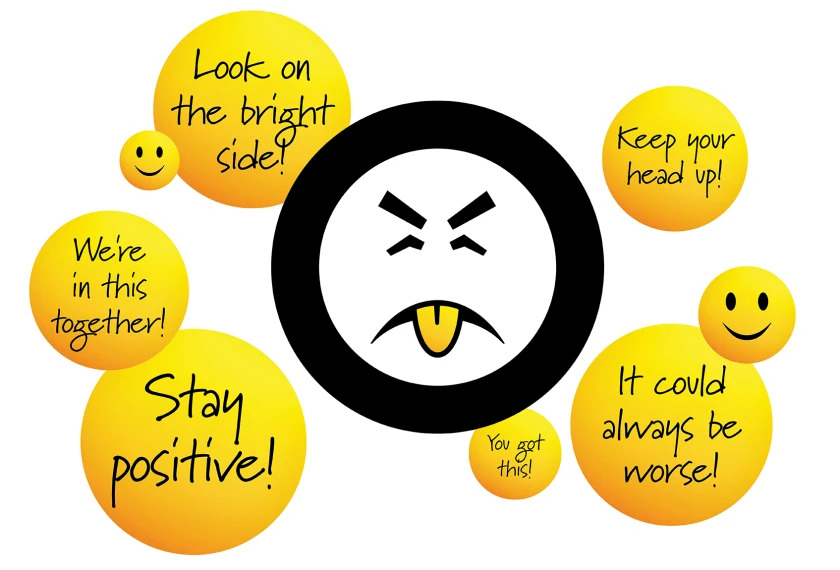SHARE
Introduction: When Positivity Becomes a Problem
We’ve all heard the advice: “Just stay positive!” “Everything happens for a reason.” “Look on the bright side!” But have you ever wondered if this could lead to toxic positivity?
At first glance, these phrases seem helpful. Positivity is often associated with resilience, motivation, and success. But what happens when positivity is forced? When it invalidates struggles instead of addressing them? This is where toxic positivity becomes a serious roadblock to personal growth and emotional intelligence.
In both life and work, real progress requires honest reflection, self-awareness, and a balanced mindset. Blind optimism can lead to avoidance, burnout, and frustration when challenges remain unresolved. In this post, we’ll dive into how toxic positivity holds you back and what you can do instead to cultivate authentic growth.
What Is Toxic Positivity?
Toxic positivity is the belief that staying positive at all costs is the only acceptable response to life’s challenges. It dismisses negative emotions, making people feel guilty for struggling instead of addressing real problems.
Some common examples of toxic positivity include:
✔️ “You should be grateful—others have it worse.”
✔️ “Just think positive thoughts, and everything will work out.”
✔️ “Don’t be negative! Stay optimistic.”
While optimism can be beneficial, forcing positivity without acknowledging reality can be damaging. Suppressing emotions doesn’t make them disappear—it only delays the opportunity for true healing and progress.
Why Toxic Positivity Hurts Your Growth
Toxic positivity isn’t just frustrating—it actively prevents professional and personal development. Here’s how:
1️⃣ It Prevents You from Addressing Real Problems
Imagine being stuck in a job that drains you, but instead of making a change, you tell yourself:
💬 “At least I have a job. I should be grateful.”
Or if you’re struggling in a toxic relationship and friends say:
💬 “Love conquers all. Just focus on the good times.”
This mindset keeps you stuck. Growth happens when you acknowledge problems and take action, not when you ignore reality. Self-awareness is the first step toward real change.
2️⃣ It Creates Emotional Suppression, Not Strength
Growth requires experiencing the full range of emotions—including frustration, sadness, and failure. These emotions teach valuable lessons:
🔹 Disappointment builds resilience.
🔹 Failure fuels learning and improvement.
🔹 Sadness deepens empathy and connection.
When we suppress emotions with forced optimism, we miss opportunities to develop emotional intelligence and coping skills. Real personal growth happens when we process emotions, not when we pretend they don’t exist.
3️⃣ It Makes You Feel Guilty for Having Negative Emotions
Ever felt like you should be happy, even when you’re struggling? Toxic positivity creates unrealistic expectations that lead to guilt.
🚫 Feeling burned out? “Just be grateful you have a job.”
🚫 Frustrated by setbacks? “Stay positive, everything happens for a reason.”
🚫 Going through personal loss? “At least you have good memories.”
Toxic positivity invalidates real emotions. Instead of pushing positivity, try acknowledging feelings with compassion and self-awareness.
4️⃣ It Hurts Workplace Culture and Relationships
Toxic positivity doesn’t just impact individuals—it affects teams, leaders, and workplace culture.
🔹 When employees feel forced to “stay positive”, they suppress concerns, leading to burnout and disengagement.
🔹 When leaders avoid difficult conversations, issues go unresolved, impacting company growth.
🔹 When friends or colleagues dismiss struggles, trust erodes instead of strengthening connections.
A healthy work and personal environment validates emotions and encourages real conversations about growth and improvement.
How to Replace Toxic Positivity with Real Growth
If toxic positivity doesn’t work, what does? A balanced mindset. Here’s how to foster authentic personal and professional growth:
1️⃣ Validate Emotions Instead of Ignoring Them
Instead of forcing happiness, practice self-awareness:
✅ Instead of “I shouldn’t feel this way,” try “It’s okay to feel this way.”
✅ Instead of “Everything happens for a reason,” try “This is hard, but I can learn from it.”
Allowing yourself to process emotions creates genuine resilience and clarity.
2️⃣ Focus on Solutions, Not Just Positivity
Optimism without action changes nothing. Instead of saying:
➡ “Everything will work out,” ask “What steps can I take to improve this?”
➡ “Just be happy,” ask “What’s making me unhappy, and what can I do about it?”
Mindset shifts work best when paired with action.
3️⃣ Support Others Without Dismissing Their Struggles
When a friend or colleague is struggling, resist the urge to “fix” their feelings with toxic positivity. Instead:
✅ Listen without judgment.
✅ Validate their emotions (“That sounds really difficult.”).
✅ Offer support instead of clichés (“How can I help?”).
Real connection comes from being present, not just being positive.
4️⃣ Redefine What It Means to Be “Positive”
Instead of forcing happiness, shift your mindset to growth-based positivity:
✔️ Authentic optimism: Acknowledging challenges while believing in solutions.
✔️ Emotional resilience: Processing setbacks instead of ignoring them.
✔️ Action-driven thinking: Taking steps toward change instead of waiting for positivity to fix things.
Positivity should empower, not suppress.
Final Thoughts: Choose Growth Over Forced Positivity
Toxic positivity keeps you stuck by convincing you to ignore problems instead of facing them head-on. True personal and professional growth happens when you:
✅ Acknowledge and process emotions.
✅ Focus on solutions, not surface-level optimism.
✅ Support others by listening, not dismissing.
✅ Embrace both the highs and the lows of life’s journey.
Positivity is powerful—but only when used authentically.
💬 What’s a piece of “positive” advice that actually backfired on you? Drop it in the comments!
#ToxicPositivity #PersonalGrowth #SelfAwareness #MindsetShift #EmotionalIntelligence #CareerDevelopment
